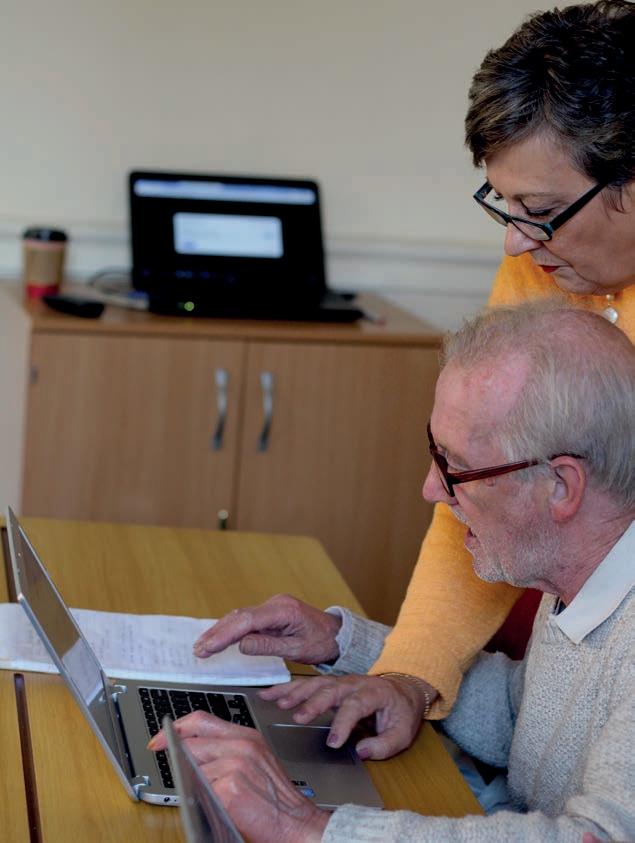
4 minute read
IRISH LIFE-LONG LEARNERS
Living in a developed European country, most of us are constantly learning while growing up. We go to school and learn how to read and write. We generally have the opportunity to go to college to achieve a job in the profession we are dreaming of pursuing. Once settled in life, there can be several reasons why learning may no longer be a constant part of someone’s life.
Although, learning should not automatically stop as soon as we have reached a profession or a certain age. Life-long learning is vital in the ever-changing world we are living in. The European Union has set a 10% target for those aged 25-64 to engage in life-long learning by 2020 and an objective of reaching 15% by 2025. According toEurostat, the EU’s statistical agency, 12.5% of Irish adults aged 25-64 were already involved in life-long learning in 2018. However, Ireland is still only ranked 10th in the European Union. 34
Advertisement
Adult education services are provided nationwide for instance by educational institutions and community services. Nearly 25 years ago the Warrenmount Community Education Centrewas set up in Dublin 8. Funded by SOLAS and The City of Dublin Education and Training Board, a wide range of free education classes such as gardening, well-being, and computer skills are offered.
Centre manager Lia Clarkson recognizes that “a centre like this certainly appears to be needed in the area.” Stressing that they “look at the needs of the area”, she also states that “generally speaking, people who come here have less upper second level education.”
‘A learner focusing on the task at hand’
Clarkson explains that the aim of the Education Centre would be “to give people a bit of a start and maybe they will progress on to higher levels of studies or work-related as well.” Furthermore, the manager added that “sometimes it is filling gaps for people, they might have lots of work experience but have never really learned how to use a computer.”
In a rapidly changing world, in which advancing technology is inevitable, learning and the ability to adapt has become essential. The momentous invention of the internet creates infinite possibilities, but only for the ones able to use it. Digital skills seem crucial nowadays in many aspects of life. Providing computer and internet classes at different levels, the community centre in Warrenmount equips its learners with digital knowledge for their daily lives.
“We are learning how to send emails, receive emails, how to book flights and hotels, things we all need to know about. Basic things, going on to order something, your shopping if you were not well, I would have never been able to do that” as a young woman told me who was attending the Basic Internet Skills course.
This years’Digital Economy and Society Index (DESI) reportby the European Commission indicates that, Ireland was ranked 6th in 2017, with 52% of its population having no basic digital skills, which is exceeding the EU average by 10%.
However, there has been a 4% decrease within one year, from previously holding a56% rate in 2016.
Having low digital skills in a digital world is a tremendous risk, notably when it comes to employ
Photographs by Rublina Freiberg
‘A volunteer helping learners in the computer class’
ment. “Lacking computer skills has definitely stopped me for the last couple of years,” admits another course participant. She continues, “at the moment I am a job seeker. I would maybe like to work with children or in hotels, but I lack in computer criteria. Internet skills for a job nowadays is a big requirement.”
In 2017, 45% of the Irish labour force had less than basic digital skills compared to the EU average of 37%. However, Ireland has improved by 5% within one year, from having a 50% rate in 2016. Getting back to ed-

ucation can be a significant burden, certainly in today’s society in which it is required to be familiar with using a laptop and accessing the world wide web.
Joining a Basic Internet Skills class one of the learners shared her experience with me. “I have done two classes but they only lasted a day. When I came in they handed me a laptop and I just could not use it. I just felt really stupid. I was embarrassed and everyone else was typing away, so I left and I came back to the computer class.”
Insufficient computer skills might be a difficulty that seems hard to overcome, especially at any particular age. However, it shall not stop people from being a life-long learner and thus disconnect them from the world. One of the elderly learners divulged that he used to get on computers, but finds it much more difficult to get on them now. He stated with confidence, “I just have to try and pick up as much as I can. I am 78. Like I say you are never too old for anything in life. I certainly will not give up, try, try, try, all the time.”
By Rubina Freiberg Life-long learning is a privilege that is not guaranteed for everyone around the globe. Even within the European Union, some countries have an adult education rate below 5%, such as Romania and Greece. Education makes life worth living and does not stop after any graduation. Lia Clarkson believes “these kinds of centres give people the tools to adapt, to understand the world a bit better and to make most of themselves.”










